人教版(新课程标准)必修四Unit 4 Body language Reading language points 课件 (49张PPT)
文档属性
| 名称 | 人教版(新课程标准)必修四Unit 4 Body language Reading language points 课件 (49张PPT) |

|
|
| 格式 | zip | ||
| 文件大小 | 51.5MB | ||
| 资源类型 | 教案 | ||
| 版本资源 | 人教版(新课程标准) | ||
| 科目 | 英语 | ||
| 更新时间 | 2023-01-03 08:49:39 | ||
图片预览

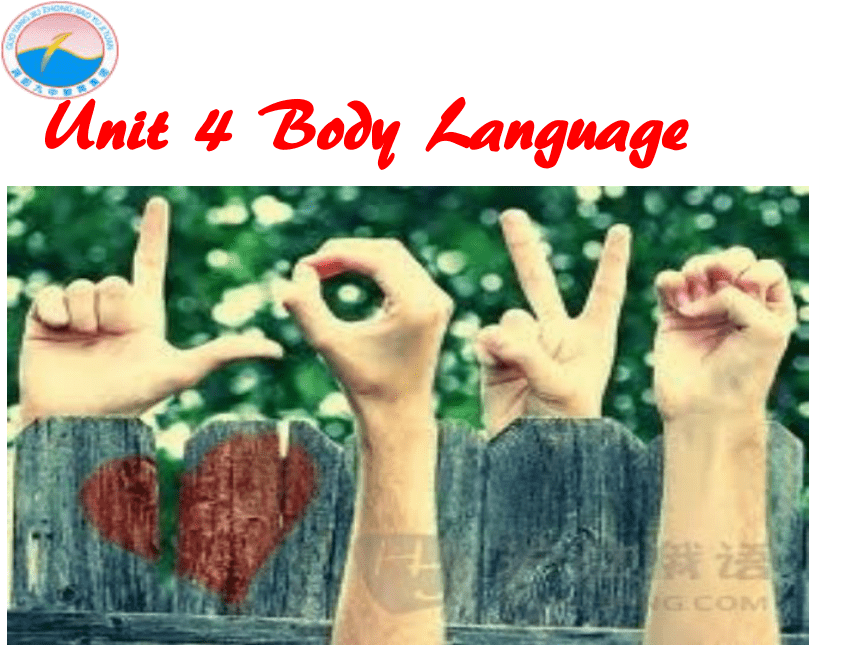
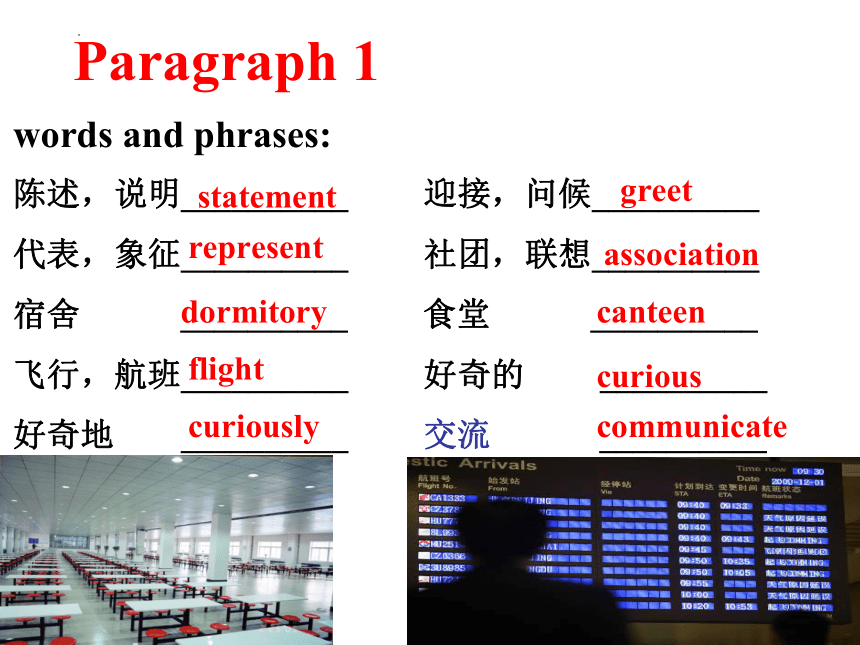
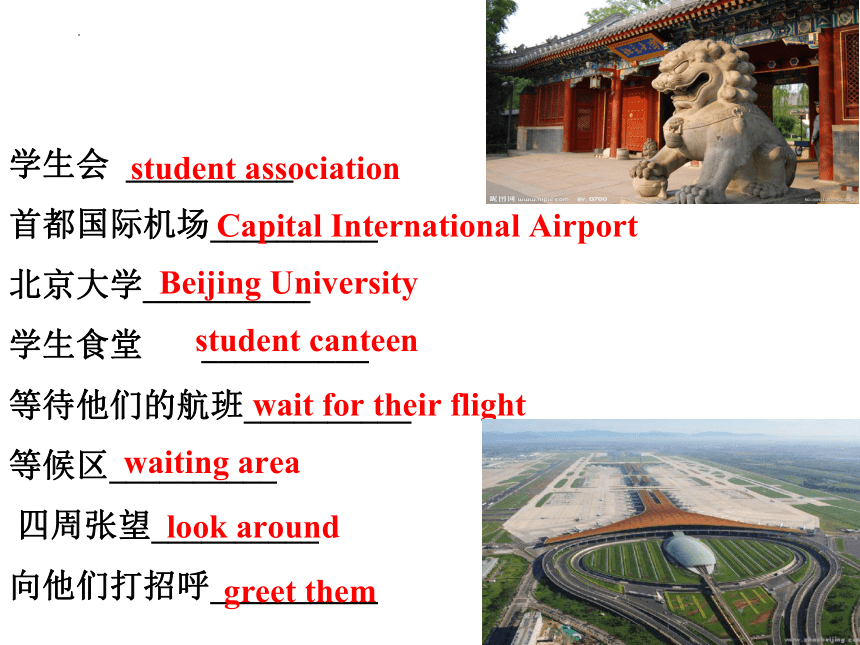
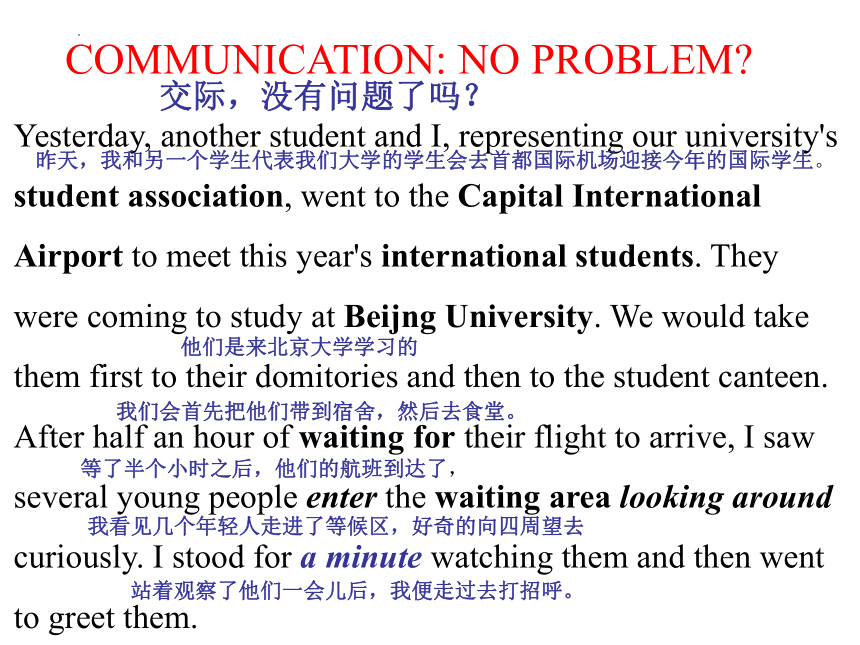


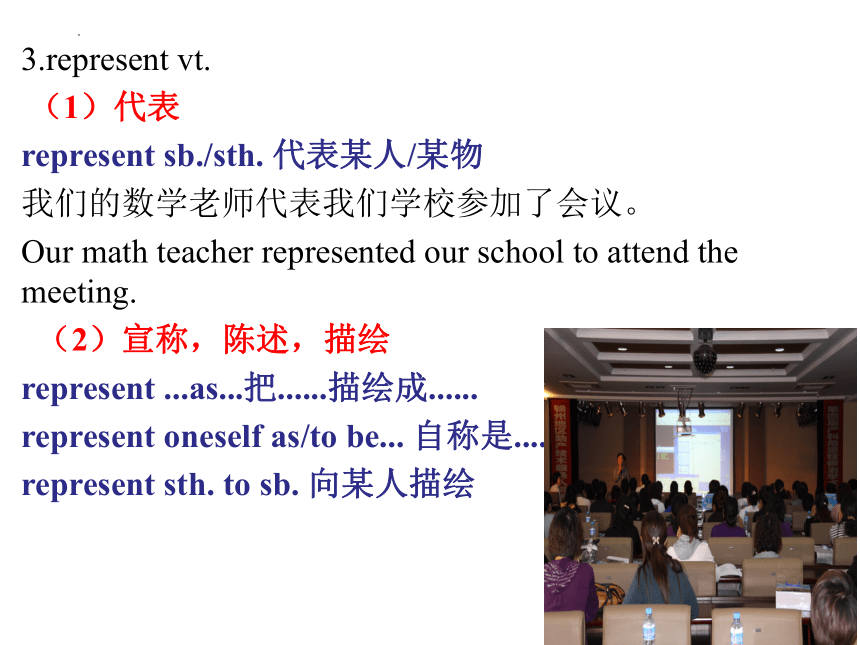
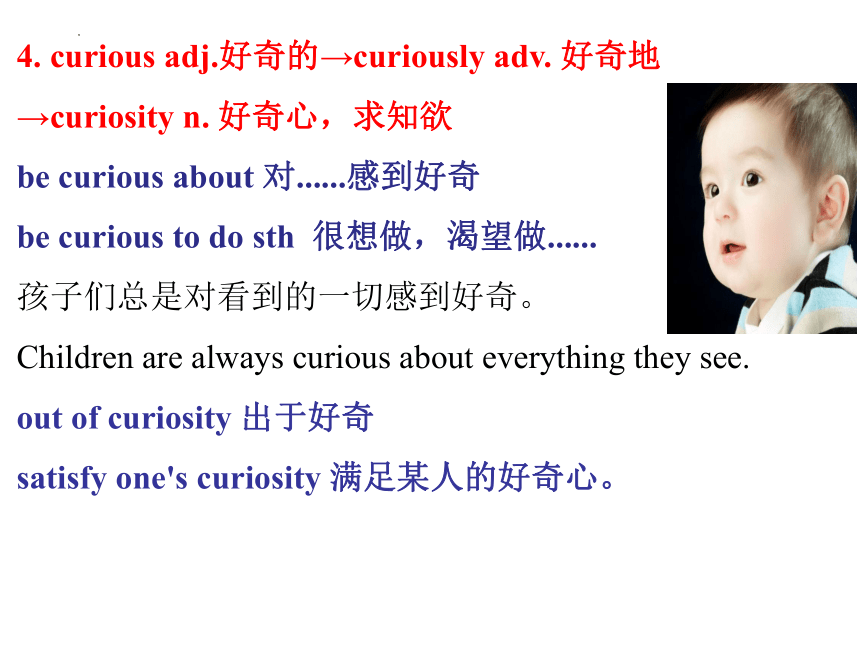
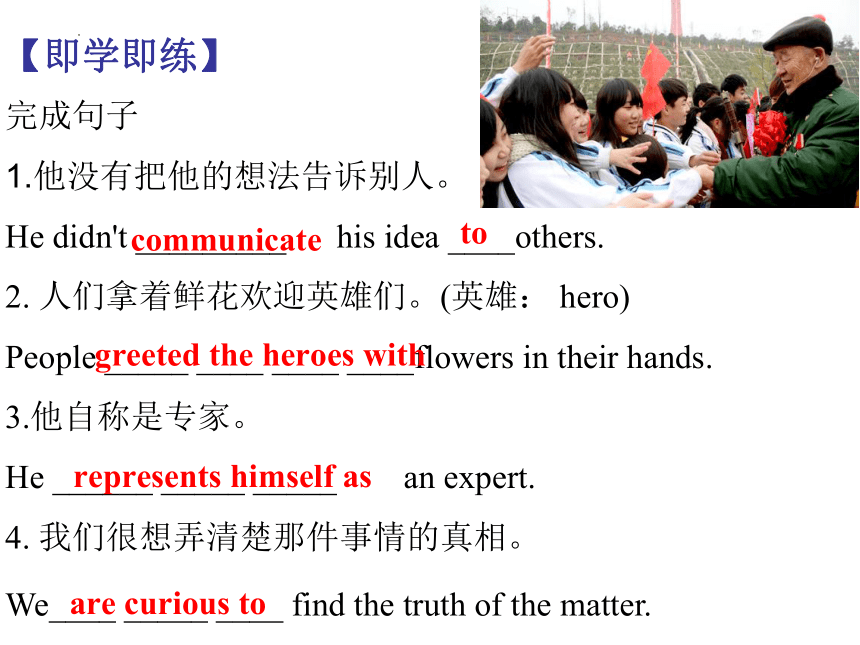
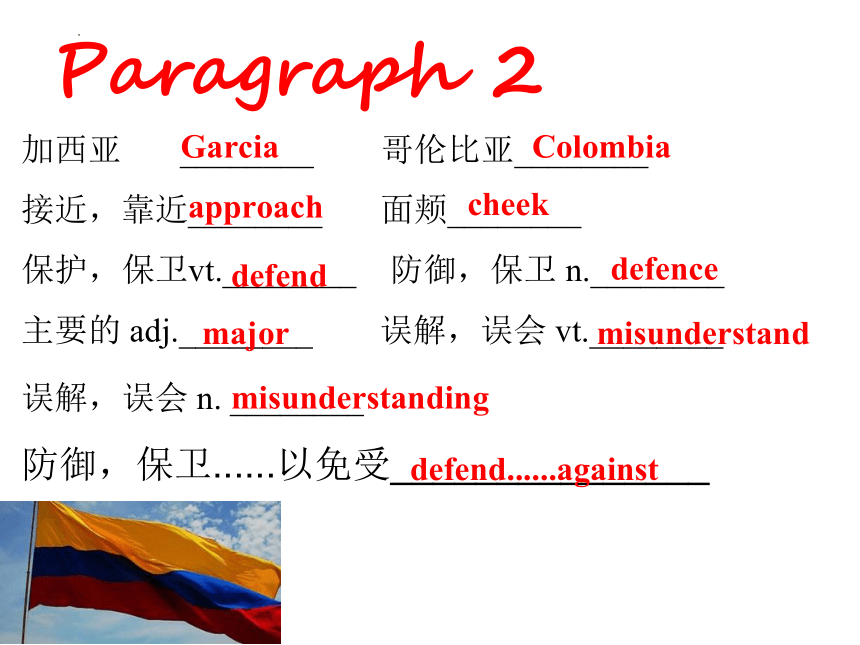
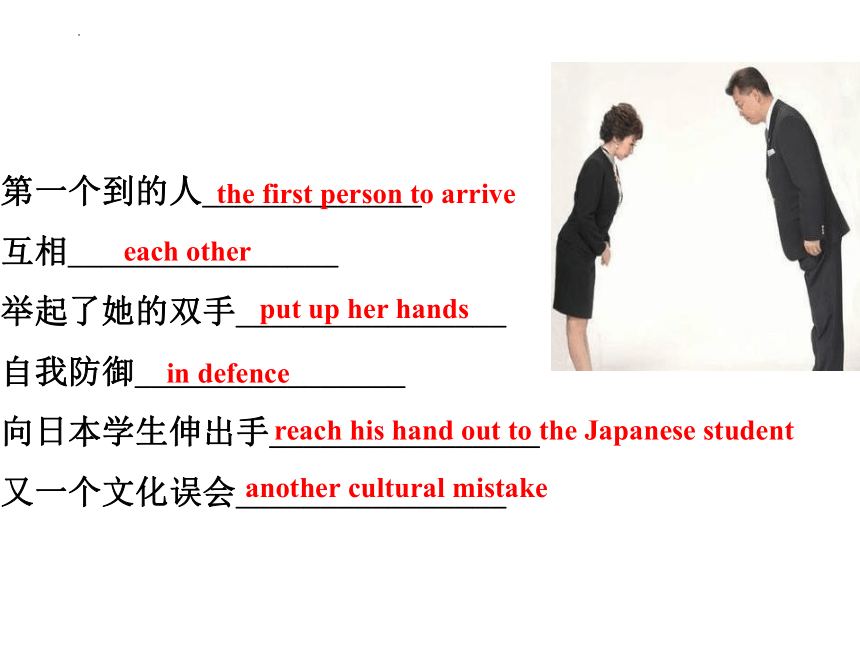
文档简介
(共49张PPT)
Unit 4 Body Language
Paragraph 1
words and phrases:
陈述,说明__________ 迎接,问候__________
代表,象征__________ 社团,联想__________
宿舍 __________ 食堂 __________
飞行,航班__________ 好奇的 __________
好奇地 __________ 交流 __________
statement
greet
represent
association
dormitory
canteen
flight
curious
curiously
communicate
学生会 __________
首都国际机场__________
北京大学__________
学生食堂 __________
等待他们的航班__________
等候区__________
四周张望__________
向他们打招呼__________
student association
Capital International Airport
Beijing University
student canteen
wait for their flight
waiting area
look around
greet them
COMMUNICATION: NO PROBLEM
Yesterday, another student and I, representing our university's student association, went to the Capital International Airport to meet this year's international students. They were coming to study at Beijng University. We would take them first to their domitories and then to the student canteen. After half an hour of waiting for their flight to arrive, I saw several young people enter the waiting area looking around curiously. I stood for a minute watching them and then went to greet them.
交际,没有问题了吗?
昨天,我和另一个学生代表我们大学的学生会去首都国际机场迎接今年的国际学生。
他们是来北京大学学习的
我们会首先把他们带到宿舍,然后去食堂。
等了半个小时之后,他们的航班到达了,
我看见几个年轻人走进了等候区,好奇的向四周望去
站着观察了他们一会儿后,我便走过去打招呼。
Language Points
1.communication n. 交流,交际→communicate v. 交流,沟通
搭配: communicate sth to sb. 把某事传达给某人
他把他的想法告诉了我。
He communicated his thoughts to me.
communicate with 与.....交流/沟通
他们彼此用电话联络。
They communicate with each other
by telephone.
2.greet vi.&vt 迎接,问候→greeting n. 问候,致意
greet sb with ...用.....向某人打招呼
老师微笑着先给我们打招呼。
The teacher greets us with a smile
3.represent vt.
(1)代表
represent sb./sth. 代表某人/某物
我们的数学老师代表我们学校参加了会议。
Our math teacher represented our school to attend the meeting.
(2)宣称,陈述,描绘
represent ...as...把......描绘成......
represent oneself as/to be... 自称是......
represent sth. to sb. 向某人描绘
4. curious adj.好奇的→curiously adv. 好奇地 →curiosity n. 好奇心,求知欲
be curious about 对......感到好奇
be curious to do sth 很想做,渴望做......
孩子们总是对看到的一切感到好奇。
Children are always curious about everything they see.
out of curiosity 出于好奇
satisfy one's curiosity 满足某人的好奇心。
【即学即练】
完成句子
1.他没有把他的想法告诉别人。
He didn't _________ his idea ____others.
2. 人们拿着鲜花欢迎英雄们。(英雄: hero)
People _____ ____ ____ ____flowers in their hands.
3.他自称是专家。
He ______ _____ _____ an expert.
4. 我们很想弄清楚那件事情的真相。
We____ _____ ____ find the truth of the matter.
communicate
to
greeted the heroes with
represents himself as
are curious to
Paragraph 2
加西亚 ________ 哥伦比亚________
接近,靠近________ 面颊________
保护,保卫vt.________ 防御,保卫 n.________
主要的 adj.________ 误解,误会 vt.________
误解,误会 n. ________
防御,保卫......以免受_______________
Garcia
Colombia
approach
cheek
defend
defence
major
misunderstand
misunderstanding
defend......against
第一个到的人_____________
互相________________
举起了她的双手________________
自我防御________________
向日本学生伸出手________________
又一个文化误会________________
the first person to arrive
each other
put up her hands
in defence
reach his hand out to the Japanese student
another cultural mistake
The first person to arrive was Tony Garcia from Colombia, closely followed by Julia Smith from Britain. After I met them and then introduced them to each other, I was very surprised. Tony approached Julia, touched her shoulder and kissed her on the cheek! She stepped back apprearing surprised and put up her hands, as if in defence.
第一个到达的人是来自哥伦比亚的托尼 加西亚,随后紧跟着的是来自英国的茱莉亚史密斯
在与他们碰面并介绍了他们彼此认识之后,我感到很吃惊
托尼走近茱莉亚摸了摸他的肩,亲了亲她的脸颊。
她后退了几步,看上去有些吃惊,并举起了双手,好像是在自我防卫。
I guessed that there was probably a major misunderstanding. Then Akira Nagata from Japan came in smiling , together with George Cook from Canada. As they were introduced , George reached his hand out to the Japanese student. just at that moment, however, Akira bowed so his nose touched George's moving hand. They both apologized --another cultral mistake.
我猜想这里可能有个大误会。
随后,来自日本的永田明微笑着走了进来,同时来的还有来自加拿大的乔治库克。
当我为他们做自我介绍的时候,乔治把手伸向了这位日本学生。
然而,那时永田明鞠了一躬,所以他的鼻子碰到了乔治伸过来的手
两个人都互相道了歉,又一个文化误会。
Language Points
1.Tony approached Julia, touched her shoulder and kissed her on the cheek!
approach
(1) vt.&vi. (距离上,时间上)接近
The time for graduation is approaching.
毕业时间临近了.
(2)n. 接近,方法,途径(常与介词to搭配)
We have found a new approach to the study of English.
我们发现了以后学英语的新方法。
kiss sb. on the cheek. 亲吻某人的脸颊
The mother kissed her son on the cheek and said good night.
妈妈亲吻了儿子并道了晚安。
2.defence n. 防卫,防备,防护
in defence (of ...) 为了保卫......; 保护
in one's defence 站在某人一边,为某人辩护
They gave their lives in defence of freedom.
他们为了捍卫自由献出了自己的生命。
defend vt. 保护,保卫
defend...from/against... 保卫......以免受......
Their duty is to defend the country against its enemy.
3. I guess that there was probably a major misunderstanding.
major adj. ,n.&vi.
(1)adj. 主要的,重要的
play a major role in sth. 在某事中起重要作用
(2)【C】主修课程,专业课
Her major is French. 它的专业是法语.
(3) vi.主修
major in 主修
She majors in history. That is, her major is history.
她主修历史,也就是说,她的专业是历史。
misunderstanding n.【C, U】误解,误会
misunderstanding of/ about sth. 关于某事的误会
misunderstanding between A and B. A与B之间的误解。
习惯用法:
There must be some misunderstanding 一定有些误会
clear up the misunderstanding between you and me.
澄清你我之间的误会。
have misundertanding over sth. 对某事的看法有分歧
have misunderstanding with sb. 与某人发生了争执
【即学即练】
1.我们对这个计划有点分歧。
We had a little misunderstanding ____ the plan.
2.我们必须澄清我们俩之间的误会。
We must _____ _____ ______ __________between us.
3. 他主修音乐,也就说,他的专业是音乐。
He_____ ____ music. That is, his ______ is music.
4. 这个年轻人参军来保卫国家。
The young man joined the army_____ _____ ____ ___ ________.
5. 所有通过机场的路都警察封锁了。
_______ _______ ____ ____ _______the airport were blocked by the police.
over
clear up the misunderstanding
majors in
major
in defence of his country
All the approaches to the airport
Paragraph 3
Words and Phrases
Ahmed Aziz 艾哈迈德 阿齐兹
Jordan n. 约旦(西亚国家)
Darlene Coulon 达琳,库隆
dash vt. 猛冲,突进
adult n.成人,成年人 adj. 成人的,成熟的
simply adv. 简单地,只
Muslim n.&adj. 穆斯林的,伊斯兰教徒的
Ahmed Aziz, another international student, was from Jordan. When we met yesterday, he moved very close to me as I introduced myself. I moved back a bit, but he came closer to ask a question and then shook my hand. When Darlence Coulon from France came dashing through the door, she recognized Tony Garcia's smiling face.
另一位国际学生艾哈迈德阿齐兹来自约旦。
我们昨天见面,我进行自我介绍的时候,他靠我很近。
我向后退了一点儿,但他又上前问了我一个问题,然后同我握手。
当来自法国的达琳库隆从门口匆忙进来时,她认出了托尼加西亚的微笑的面孔。
They shook hands and then kissed each other twice on each cheek, since that is the French custom when adults meet people they know. Ahmed Aziz, on the contrary, simply nodded at the girls. Men from Middle Eastern and other Muslim countries will often stand quite close to other men to talk but will usually not touch women.
他们握了握手,并且在对方的面颊上吻了两下。
通常法国成年人见到熟人就是这么做的。
相反,艾哈迈德阿齐兹只是朝女孩们点了点头。
来自中东和其他伊斯兰国家的男士在谈话时通常站得离其他男士很近,
但一般不会与女士接触。
Language points
1.When Darlence Coulon from France came dashing through the door, she recognized Tony Garcia's smiling face.
这是一个主从复合句。when引导时间状语从句,从句中现在分词短语dashing through the door作方式状语,修饰came。
dash vi 猛冲,突进
dash into 冲进,奔到
dash out of 冲出
dash through 冲过
dash across 冲过
Jane dashed into the room, grabbed her bag and rushed out again.
简冲进了房间,抓起她的包又冲了出来。
2. Ahmed Aziz, on the contrary, simply nodded at the girls
on the contrary 与此相反,正相反(用于说明与前面所述事情相反,作状语,位置灵活)
It wasn't a good thing; on the contrary,
it was a huge mistake.
那不是意见好事,相反,那是个巨大的错误。
【即学即练】
1. 我没有生病,相反,我很健康。
I‘m not ill. ______ ______ ________ , I 'm very healthy.
2. 这个孩子匆忙的冲过马路。
The child _____ ______ the street.
On the contrary
dashed across
Paragraph 4
口语的 adj. ________ 未说出口的adj. ________
姿势,体态________ 西班牙________
意大利 ——— 可能的 ________
很可能......________ 国际朋友________
身势语 ________ 用一种方式________
口头语言. ________
全世界_______________
spoken
unspoken
Spain
likely
be likely to
international friends
body language
in the same way
spoken language
around the world
posture
Italy
As I get to know more international friends, I learn more about this cultural "body language". Not all cultures greet each other the same way, nor are they comfortable in the same way with touching or distance between people. In the same way that people communicate with spoken language, they also express their feelings using unspoken "language" through physical distance, actions or posture.
随着认识的国际朋友越来越多,我也了解到更多不同文化背景下的“身势语”
各种文化背景下人们互致问候的方式不尽相同
对身体接触和相互间距所感到的舒适的程度也并不一样。
用口头语言交流的同时,人们还使用不出声的“语言”,
通过身体间的距离,动作或姿势来表达情感。
English people , for example, do not usually stand very close to others to touch strangers as soon as they meet.However, people from places like Spain , Italy or South American countries approach others closely and are more likely to touch them. Most people around the world now greet each other by shaking hands, but some cultures use other greetings as well as the Japanese, who prefer to bow.
比如英国人通常不会站在离别人太近的地方,也不会一见面就接触陌生人。
不过来自西班牙,意大利或南美等国的人会站在离别人很近的地方,而且更可能接触对方
现在世界上大多数人见面要握手相互问候,但有些文化也会采取另外一些寒暄方式。
比如说,日本人就更愿意鞠躬。
language Points
1.As I get to know more international friends, I learn more about this cultural "body language".
get to do sth 逐渐做某事
get to know/ understand/realize
逐渐知道/明白/意识到...
我们逐渐意识到英语的重要性。
We get to realize the impotance of English.
2.Not all cultures greet each other the same way, nor are they comfortable in the same way with touching or distance between people.
各种文化背景下人们互致问候的方式不尽相同对身体接触和相互间距所感到的舒适的程度
部分否定: not all..."并非所有的......都.....". 当not 与all , every, everyone, everything, both, always 等连用时,表示部分否定。
并非所有的同学都喜欢音乐。
Not all the students are fond of music.
若表示完全否定,可用nobody, never, no, none, neither等。
没有一个学生理解他
None of the students can understand him.
.
3.However, people from places like Spain , Italy or South American countries approach others closely and are more likely to touch them.
不过来自西班牙,意大利或南美等国的人会站在离别人很近的地方,而且更可能接触对方
likely adj. 可能的,预料的,有希望的
be likely to do sth. 可能做某事
It is likely that... 可能......
他有可能是最后一个离开教室的同学。
He is likely to be the last student to leave the classroom.
It is likely that he is the last student to leave the classroom.
Paragraph 5
Words and Phrases
总的来说 in general
十字路口 crossroads
文化习俗 cultural customs
These actions are not good or bad, but are simply ways in which cultures have developed. I have seen, however, that cultural customs for body language are very general- not all members of a culture behave in the same way. In general, though, studying international customs can certainly help avoid difficulties in today's world of cultural crossroads.
这些行为都无所谓好与坏,只不过是文化发展的不同方式而已。
然而,我发现身势语的文化习俗是非常概括性的
同一种民族文化中也并非所有成员的行为都一样。
但总的来说,在当今文化交融的世界,学习不同国家的习俗肯定能帮助我们避免交往中的困难。
language points
1.These actions are not good or bad
not... or... “既不...也不...”
他既不喜欢音乐也不喜欢体育。
He doesn't like music or sports.
2.In general, though, studying international customs can certainly help avoid difficulties in today's world of cultural crossroads.
in general 总的来说,从总体上看,大体上
各种运动我通常都喜欢,尤其是足球
I like sports in general, especially football.
avoid vt. 避免,逃避
avoid doing sth. 避免做某事
他试图避而不答我的问题。
He tried to avoid answering my questions.
【拓展】
只能接动名词的动词:
miss(错过), finish(完成),enjoy(喜欢),practice(练习)
risk(冒险),admit(承认),can't help (情不自禁)
feel lke (想要)
Scanning
How many international students are there in the story
Who are they and where they come from
Scan the text and answer the following questions.
Six
Who are they and where do they come from
Tony Garcia
Julia Smith
Akira Nagata
George Cook
Ahmed Aziz
Darlene Coulon
Columbia
Britain
Japan
Canada
Jordan
France
(Para.1)
(Para. 2~3)
(Para. 4)
(Para. 5)
Different people have different
body language.
Meet the visitors at the airport.
Summary of body language.
Match the main idea of each part with lines.
Part 1.
Part 2.
Part 3.
Part 4.
People from different countries express greetings in different ways.
1. What did the writer go to the Capital International Airport
for yesterday
A. To see off his friend. B. To meet international students.
C. To buy a flight ticket. D. To meet visitors from several countries.
2. Where is Tony Garcia from
A. Britain. B. Japan. C. Colombia. D. Canada.
3. From Paragraph 2 we know that Japanese prefer to ____ when
they are introduced to others .
A. bow B. shake hands C. kiss D. touch others’ shoulders
4. According to the text, men from the Middle East often ____.
A. nod heads and wave hands to girls
B. touch others’ heads when they first meet
C. kiss each other twice on each cheek
D. stand quite close to other men when they talk
B
Scan the text and choose the best answer.
C
A
D
Englishmen often stand close to others or touch strangers as soon as they meet.
Most people around the world now greet each other by kissing .
Japanese will bow to others as greeting.
People from Jordan will move very close to you as you introduce yourself to them.
Some body languages in some countries are good while some countries’ body language are bad.
Read the text carefully, and do the T or F. If false, correct the mistakes.
T
F
T
F
F
don’t
shaking hands.
E.g. Ahmed Aziz
These actions is not good or bad.
Mr. Garcia (Columbia)
Julia Smith (Britain)
George Cook (Canada)
a Japanese
Read para2 carefully: Find out the two cultural mistakes the writer found in the airport.
Mr. Garcia
Julia Smith
The first culturalmistake
from ( )
From
( )
Columbia
Britain
He approaches Ms Smith by _______ ______ _________ and _______ her on the ________.
She ______ ________ appearing _________ and put up her hands, as if _______ ______.
shoulder
touching
her
kissing
cheek
stepped back
surprised
in defence
The second culturalmistake
a Japanese
George Cook
from
(Canada)
He ________ ________ _______ ________ to the Japanese.
He ________ to Mr. Cook and his nose _________ Mr. Cook’s _______ ________.
bowed
touched
moving
hand
reached
his hand
out
Retelling
Yesterday I ______ our student association to go to CIA to _____international students. The first one to _____is Mr. Garcia from Columbia, closely ______by Julia Smith from Britain. I _____ them to each other ,and I was _____to see them greet each other. Just then, a visitor from Japan comes in ____, together with Gorge Cook from Canada. When Gorge ____his hand out to him, it happens that Mr Cook’s hand ____the Japanese’s nose as he ____. So you see, people from _____cultures may not _____others in the same way. Now ,most people around the world _____hands when they meet while the ______ prefer to bow.
In a word, body languages are not ____or ____, which are widely used in _____ in today’s world .
represented
meet
arrive
followed
introduced
surprised
smiling
reached
touched
bowed
different
greet
shake
Japanese
good
bad
communication
Different countries have different cultures and body languages , so when people greet each other, they will have different body languages. If people don’t know the cultural differences well, people may have difficulties in communicating with others throughout the world.
Discussion
What can we learn from the passage
Unit 4 Body Language
Paragraph 1
words and phrases:
陈述,说明__________ 迎接,问候__________
代表,象征__________ 社团,联想__________
宿舍 __________ 食堂 __________
飞行,航班__________ 好奇的 __________
好奇地 __________ 交流 __________
statement
greet
represent
association
dormitory
canteen
flight
curious
curiously
communicate
学生会 __________
首都国际机场__________
北京大学__________
学生食堂 __________
等待他们的航班__________
等候区__________
四周张望__________
向他们打招呼__________
student association
Capital International Airport
Beijing University
student canteen
wait for their flight
waiting area
look around
greet them
COMMUNICATION: NO PROBLEM
Yesterday, another student and I, representing our university's student association, went to the Capital International Airport to meet this year's international students. They were coming to study at Beijng University. We would take them first to their domitories and then to the student canteen. After half an hour of waiting for their flight to arrive, I saw several young people enter the waiting area looking around curiously. I stood for a minute watching them and then went to greet them.
交际,没有问题了吗?
昨天,我和另一个学生代表我们大学的学生会去首都国际机场迎接今年的国际学生。
他们是来北京大学学习的
我们会首先把他们带到宿舍,然后去食堂。
等了半个小时之后,他们的航班到达了,
我看见几个年轻人走进了等候区,好奇的向四周望去
站着观察了他们一会儿后,我便走过去打招呼。
Language Points
1.communication n. 交流,交际→communicate v. 交流,沟通
搭配: communicate sth to sb. 把某事传达给某人
他把他的想法告诉了我。
He communicated his thoughts to me.
communicate with 与.....交流/沟通
他们彼此用电话联络。
They communicate with each other
by telephone.
2.greet vi.&vt 迎接,问候→greeting n. 问候,致意
greet sb with ...用.....向某人打招呼
老师微笑着先给我们打招呼。
The teacher greets us with a smile
3.represent vt.
(1)代表
represent sb./sth. 代表某人/某物
我们的数学老师代表我们学校参加了会议。
Our math teacher represented our school to attend the meeting.
(2)宣称,陈述,描绘
represent ...as...把......描绘成......
represent oneself as/to be... 自称是......
represent sth. to sb. 向某人描绘
4. curious adj.好奇的→curiously adv. 好奇地 →curiosity n. 好奇心,求知欲
be curious about 对......感到好奇
be curious to do sth 很想做,渴望做......
孩子们总是对看到的一切感到好奇。
Children are always curious about everything they see.
out of curiosity 出于好奇
satisfy one's curiosity 满足某人的好奇心。
【即学即练】
完成句子
1.他没有把他的想法告诉别人。
He didn't _________ his idea ____others.
2. 人们拿着鲜花欢迎英雄们。(英雄: hero)
People _____ ____ ____ ____flowers in their hands.
3.他自称是专家。
He ______ _____ _____ an expert.
4. 我们很想弄清楚那件事情的真相。
We____ _____ ____ find the truth of the matter.
communicate
to
greeted the heroes with
represents himself as
are curious to
Paragraph 2
加西亚 ________ 哥伦比亚________
接近,靠近________ 面颊________
保护,保卫vt.________ 防御,保卫 n.________
主要的 adj.________ 误解,误会 vt.________
误解,误会 n. ________
防御,保卫......以免受_______________
Garcia
Colombia
approach
cheek
defend
defence
major
misunderstand
misunderstanding
defend......against
第一个到的人_____________
互相________________
举起了她的双手________________
自我防御________________
向日本学生伸出手________________
又一个文化误会________________
the first person to arrive
each other
put up her hands
in defence
reach his hand out to the Japanese student
another cultural mistake
The first person to arrive was Tony Garcia from Colombia, closely followed by Julia Smith from Britain. After I met them and then introduced them to each other, I was very surprised. Tony approached Julia, touched her shoulder and kissed her on the cheek! She stepped back apprearing surprised and put up her hands, as if in defence.
第一个到达的人是来自哥伦比亚的托尼 加西亚,随后紧跟着的是来自英国的茱莉亚史密斯
在与他们碰面并介绍了他们彼此认识之后,我感到很吃惊
托尼走近茱莉亚摸了摸他的肩,亲了亲她的脸颊。
她后退了几步,看上去有些吃惊,并举起了双手,好像是在自我防卫。
I guessed that there was probably a major misunderstanding. Then Akira Nagata from Japan came in smiling , together with George Cook from Canada. As they were introduced , George reached his hand out to the Japanese student. just at that moment, however, Akira bowed so his nose touched George's moving hand. They both apologized --another cultral mistake.
我猜想这里可能有个大误会。
随后,来自日本的永田明微笑着走了进来,同时来的还有来自加拿大的乔治库克。
当我为他们做自我介绍的时候,乔治把手伸向了这位日本学生。
然而,那时永田明鞠了一躬,所以他的鼻子碰到了乔治伸过来的手
两个人都互相道了歉,又一个文化误会。
Language Points
1.Tony approached Julia, touched her shoulder and kissed her on the cheek!
approach
(1) vt.&vi. (距离上,时间上)接近
The time for graduation is approaching.
毕业时间临近了.
(2)n. 接近,方法,途径(常与介词to搭配)
We have found a new approach to the study of English.
我们发现了以后学英语的新方法。
kiss sb. on the cheek. 亲吻某人的脸颊
The mother kissed her son on the cheek and said good night.
妈妈亲吻了儿子并道了晚安。
2.defence n. 防卫,防备,防护
in defence (of ...) 为了保卫......; 保护
in one's defence 站在某人一边,为某人辩护
They gave their lives in defence of freedom.
他们为了捍卫自由献出了自己的生命。
defend vt. 保护,保卫
defend...from/against... 保卫......以免受......
Their duty is to defend the country against its enemy.
3. I guess that there was probably a major misunderstanding.
major adj. ,n.&vi.
(1)adj. 主要的,重要的
play a major role in sth. 在某事中起重要作用
(2)【C】主修课程,专业课
Her major is French. 它的专业是法语.
(3) vi.主修
major in 主修
She majors in history. That is, her major is history.
她主修历史,也就是说,她的专业是历史。
misunderstanding n.【C, U】误解,误会
misunderstanding of/ about sth. 关于某事的误会
misunderstanding between A and B. A与B之间的误解。
习惯用法:
There must be some misunderstanding 一定有些误会
clear up the misunderstanding between you and me.
澄清你我之间的误会。
have misundertanding over sth. 对某事的看法有分歧
have misunderstanding with sb. 与某人发生了争执
【即学即练】
1.我们对这个计划有点分歧。
We had a little misunderstanding ____ the plan.
2.我们必须澄清我们俩之间的误会。
We must _____ _____ ______ __________between us.
3. 他主修音乐,也就说,他的专业是音乐。
He_____ ____ music. That is, his ______ is music.
4. 这个年轻人参军来保卫国家。
The young man joined the army_____ _____ ____ ___ ________.
5. 所有通过机场的路都警察封锁了。
_______ _______ ____ ____ _______the airport were blocked by the police.
over
clear up the misunderstanding
majors in
major
in defence of his country
All the approaches to the airport
Paragraph 3
Words and Phrases
Ahmed Aziz 艾哈迈德 阿齐兹
Jordan n. 约旦(西亚国家)
Darlene Coulon 达琳,库隆
dash vt. 猛冲,突进
adult n.成人,成年人 adj. 成人的,成熟的
simply adv. 简单地,只
Muslim n.&adj. 穆斯林的,伊斯兰教徒的
Ahmed Aziz, another international student, was from Jordan. When we met yesterday, he moved very close to me as I introduced myself. I moved back a bit, but he came closer to ask a question and then shook my hand. When Darlence Coulon from France came dashing through the door, she recognized Tony Garcia's smiling face.
另一位国际学生艾哈迈德阿齐兹来自约旦。
我们昨天见面,我进行自我介绍的时候,他靠我很近。
我向后退了一点儿,但他又上前问了我一个问题,然后同我握手。
当来自法国的达琳库隆从门口匆忙进来时,她认出了托尼加西亚的微笑的面孔。
They shook hands and then kissed each other twice on each cheek, since that is the French custom when adults meet people they know. Ahmed Aziz, on the contrary, simply nodded at the girls. Men from Middle Eastern and other Muslim countries will often stand quite close to other men to talk but will usually not touch women.
他们握了握手,并且在对方的面颊上吻了两下。
通常法国成年人见到熟人就是这么做的。
相反,艾哈迈德阿齐兹只是朝女孩们点了点头。
来自中东和其他伊斯兰国家的男士在谈话时通常站得离其他男士很近,
但一般不会与女士接触。
Language points
1.When Darlence Coulon from France came dashing through the door, she recognized Tony Garcia's smiling face.
这是一个主从复合句。when引导时间状语从句,从句中现在分词短语dashing through the door作方式状语,修饰came。
dash vi 猛冲,突进
dash into 冲进,奔到
dash out of 冲出
dash through 冲过
dash across 冲过
Jane dashed into the room, grabbed her bag and rushed out again.
简冲进了房间,抓起她的包又冲了出来。
2. Ahmed Aziz, on the contrary, simply nodded at the girls
on the contrary 与此相反,正相反(用于说明与前面所述事情相反,作状语,位置灵活)
It wasn't a good thing; on the contrary,
it was a huge mistake.
那不是意见好事,相反,那是个巨大的错误。
【即学即练】
1. 我没有生病,相反,我很健康。
I‘m not ill. ______ ______ ________ , I 'm very healthy.
2. 这个孩子匆忙的冲过马路。
The child _____ ______ the street.
On the contrary
dashed across
Paragraph 4
口语的 adj. ________ 未说出口的adj. ________
姿势,体态________ 西班牙________
意大利 ——— 可能的 ________
很可能......________ 国际朋友________
身势语 ________ 用一种方式________
口头语言. ________
全世界_______________
spoken
unspoken
Spain
likely
be likely to
international friends
body language
in the same way
spoken language
around the world
posture
Italy
As I get to know more international friends, I learn more about this cultural "body language". Not all cultures greet each other the same way, nor are they comfortable in the same way with touching or distance between people. In the same way that people communicate with spoken language, they also express their feelings using unspoken "language" through physical distance, actions or posture.
随着认识的国际朋友越来越多,我也了解到更多不同文化背景下的“身势语”
各种文化背景下人们互致问候的方式不尽相同
对身体接触和相互间距所感到的舒适的程度也并不一样。
用口头语言交流的同时,人们还使用不出声的“语言”,
通过身体间的距离,动作或姿势来表达情感。
English people , for example, do not usually stand very close to others to touch strangers as soon as they meet.However, people from places like Spain , Italy or South American countries approach others closely and are more likely to touch them. Most people around the world now greet each other by shaking hands, but some cultures use other greetings as well as the Japanese, who prefer to bow.
比如英国人通常不会站在离别人太近的地方,也不会一见面就接触陌生人。
不过来自西班牙,意大利或南美等国的人会站在离别人很近的地方,而且更可能接触对方
现在世界上大多数人见面要握手相互问候,但有些文化也会采取另外一些寒暄方式。
比如说,日本人就更愿意鞠躬。
language Points
1.As I get to know more international friends, I learn more about this cultural "body language".
get to do sth 逐渐做某事
get to know/ understand/realize
逐渐知道/明白/意识到...
我们逐渐意识到英语的重要性。
We get to realize the impotance of English.
2.Not all cultures greet each other the same way, nor are they comfortable in the same way with touching or distance between people.
各种文化背景下人们互致问候的方式不尽相同对身体接触和相互间距所感到的舒适的程度
部分否定: not all..."并非所有的......都.....". 当not 与all , every, everyone, everything, both, always 等连用时,表示部分否定。
并非所有的同学都喜欢音乐。
Not all the students are fond of music.
若表示完全否定,可用nobody, never, no, none, neither等。
没有一个学生理解他
None of the students can understand him.
.
3.However, people from places like Spain , Italy or South American countries approach others closely and are more likely to touch them.
不过来自西班牙,意大利或南美等国的人会站在离别人很近的地方,而且更可能接触对方
likely adj. 可能的,预料的,有希望的
be likely to do sth. 可能做某事
It is likely that... 可能......
他有可能是最后一个离开教室的同学。
He is likely to be the last student to leave the classroom.
It is likely that he is the last student to leave the classroom.
Paragraph 5
Words and Phrases
总的来说 in general
十字路口 crossroads
文化习俗 cultural customs
These actions are not good or bad, but are simply ways in which cultures have developed. I have seen, however, that cultural customs for body language are very general- not all members of a culture behave in the same way. In general, though, studying international customs can certainly help avoid difficulties in today's world of cultural crossroads.
这些行为都无所谓好与坏,只不过是文化发展的不同方式而已。
然而,我发现身势语的文化习俗是非常概括性的
同一种民族文化中也并非所有成员的行为都一样。
但总的来说,在当今文化交融的世界,学习不同国家的习俗肯定能帮助我们避免交往中的困难。
language points
1.These actions are not good or bad
not... or... “既不...也不...”
他既不喜欢音乐也不喜欢体育。
He doesn't like music or sports.
2.In general, though, studying international customs can certainly help avoid difficulties in today's world of cultural crossroads.
in general 总的来说,从总体上看,大体上
各种运动我通常都喜欢,尤其是足球
I like sports in general, especially football.
avoid vt. 避免,逃避
avoid doing sth. 避免做某事
他试图避而不答我的问题。
He tried to avoid answering my questions.
【拓展】
只能接动名词的动词:
miss(错过), finish(完成),enjoy(喜欢),practice(练习)
risk(冒险),admit(承认),can't help (情不自禁)
feel lke (想要)
Scanning
How many international students are there in the story
Who are they and where they come from
Scan the text and answer the following questions.
Six
Who are they and where do they come from
Tony Garcia
Julia Smith
Akira Nagata
George Cook
Ahmed Aziz
Darlene Coulon
Columbia
Britain
Japan
Canada
Jordan
France
(Para.1)
(Para. 2~3)
(Para. 4)
(Para. 5)
Different people have different
body language.
Meet the visitors at the airport.
Summary of body language.
Match the main idea of each part with lines.
Part 1.
Part 2.
Part 3.
Part 4.
People from different countries express greetings in different ways.
1. What did the writer go to the Capital International Airport
for yesterday
A. To see off his friend. B. To meet international students.
C. To buy a flight ticket. D. To meet visitors from several countries.
2. Where is Tony Garcia from
A. Britain. B. Japan. C. Colombia. D. Canada.
3. From Paragraph 2 we know that Japanese prefer to ____ when
they are introduced to others .
A. bow B. shake hands C. kiss D. touch others’ shoulders
4. According to the text, men from the Middle East often ____.
A. nod heads and wave hands to girls
B. touch others’ heads when they first meet
C. kiss each other twice on each cheek
D. stand quite close to other men when they talk
B
Scan the text and choose the best answer.
C
A
D
Englishmen often stand close to others or touch strangers as soon as they meet.
Most people around the world now greet each other by kissing .
Japanese will bow to others as greeting.
People from Jordan will move very close to you as you introduce yourself to them.
Some body languages in some countries are good while some countries’ body language are bad.
Read the text carefully, and do the T or F. If false, correct the mistakes.
T
F
T
F
F
don’t
shaking hands.
E.g. Ahmed Aziz
These actions is not good or bad.
Mr. Garcia (Columbia)
Julia Smith (Britain)
George Cook (Canada)
a Japanese
Read para2 carefully: Find out the two cultural mistakes the writer found in the airport.
Mr. Garcia
Julia Smith
The first culturalmistake
from ( )
From
( )
Columbia
Britain
He approaches Ms Smith by _______ ______ _________ and _______ her on the ________.
She ______ ________ appearing _________ and put up her hands, as if _______ ______.
shoulder
touching
her
kissing
cheek
stepped back
surprised
in defence
The second culturalmistake
a Japanese
George Cook
from
(Canada)
He ________ ________ _______ ________ to the Japanese.
He ________ to Mr. Cook and his nose _________ Mr. Cook’s _______ ________.
bowed
touched
moving
hand
reached
his hand
out
Retelling
Yesterday I ______ our student association to go to CIA to _____international students. The first one to _____is Mr. Garcia from Columbia, closely ______by Julia Smith from Britain. I _____ them to each other ,and I was _____to see them greet each other. Just then, a visitor from Japan comes in ____, together with Gorge Cook from Canada. When Gorge ____his hand out to him, it happens that Mr Cook’s hand ____the Japanese’s nose as he ____. So you see, people from _____cultures may not _____others in the same way. Now ,most people around the world _____hands when they meet while the ______ prefer to bow.
In a word, body languages are not ____or ____, which are widely used in _____ in today’s world .
represented
meet
arrive
followed
introduced
surprised
smiling
reached
touched
bowed
different
greet
shake
Japanese
good
bad
communication
Different countries have different cultures and body languages , so when people greet each other, they will have different body languages. If people don’t know the cultural differences well, people may have difficulties in communicating with others throughout the world.
Discussion
What can we learn from the passage
同课章节目录
